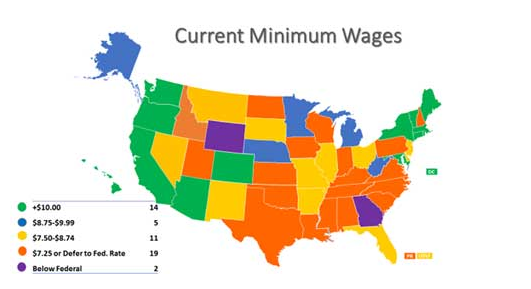Eighteen states began the new year with higher minimum wages. Eight states (Alaska, Florida, Minnesota, Montana, New Jersey, Ohio, South Dakota and Vermont) automatically increased their rates based on the cost of living, while 10 states (Arizona, Arkansas, California, Colorado, Maine, Massacusetts, Missouri, New York, Rhode Island and Washington) increased their rates due to previously approved legislation or ballot initiatives. Other states that will see rate increases during the 2019 calendar year include D.C., Delaware, Michigan and Oregon.
New Jersey enacted AB 15 in February, which will gradually increase the minimum wage rate to $15 by 2024. (The minimum wage for tipped employees will increase to $9.87 over the same period.) The schedule of annual increases was delayed for certain seasonal workers and employees of small employers, and a training wage of 90 percent of the minimum wage was created for certain employees for their first 120 hours of work.
Illinois enacted SB 1 in February, which will phase in a minimum wage increase to $15 by 2025. The measure also adjusted the youth wage for workers under age 18 (it will gradually increase to $13 by 2025) and created a tax credit program to offset labor cost increases for smaller employers.
Maryland's legislature overrode a gubernatorial veto to enact a measure (SB 280) that phased-in a minimum wage increase to $15 by 2024 (with a delayed schedule of rate increases for smaller employers) and eliminated and the state subminimum wage for employees younger than age 20.
New Mexico enacted SB 437 in April, which will raise the state minimum wage to $12 by 2023. The measure also established a training wage for high school students and slightly increased the tipped minimum wage.
Connecticut enacted HB 5004 in May, which will raise the state minimum wage to $15 by 2023. The measure also indexed the minimum wage to the employment cost index.
Nevada enacted AB 456 in June, which phases in a minimum wage increase over several years. By July 1, 2024, the minimum wage will be $11.00 for employers that offer their employees health benefits and $12.00 for employers that do not offer health benefits.

